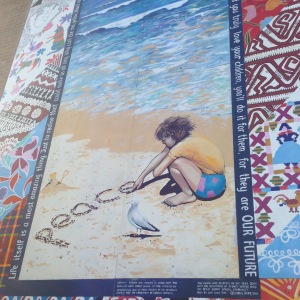Thinking of embracing the nomadic lifestyle? Or how about just taking the family on a holiday? Here are a few ideas and practical ways to work through culture shock, from our family to yours.
First it’s important to understand that each society has its own beliefs, attitudes, customs, behaviors, and social habits. These give people a sense of who they are, how they should behave, and what they should or should not do. These ‘rules’ reflect the ‘culture’ of a country. People become conscious of such rules when they meet people from different cultures. And so, culture shock is the interesting phenomena of realizing you don’t know those rules.
Culture shock has been defined as the feeling of disorientation, loneliness, insecurity or confusion that can occur when one is suddenly subjected to an unfamiliar culture, way of life, or set of attitudes.
Culture shock may come with any of the following symptoms:
- Homesickness
- Loneliness
- Depression
- Need for more sleep than normal
- Withdrawal from social activities
- Compulsive eating or loss of appetite
- Stereotyping of and hostility towards host nationals
- Lack of energy
As nomads, we’ve found that the more we thrust ourselves into new and unfamiliar surroundings or sit at the table with folks who think differently than us, the more barriers are broken down. And so, it is important, as we travel, to honestly accept that culture shock is a natural part of the experience, yet we have learned ways to quickly realign our orientation so that we can really engage, understand and enjoy the world around us.
One of the ways we do that is to embrace the physical symptoms and if possible we allow our bodies to get more sleep. We also pay attention to our food intake, making sure to get enough energy rich nutrients and plenty of h20. When possible, we cook for our hosts as this allows for us to eat foods that are familiar. It’s all common sense, basic stuff, but the key is to pay attention and embrace our bodies needs, whether for food, liquids or sleep.
Emotionally, we combat potential depression by talking about how we are feeling, specially if we’ve been in a situation where the world around us is dark and destructive. We talk about the feelings that are evoked when we see things that make us angry or uncomfortable and we allow each other to have those feelings as we process them out. That’s actually one of the greatest gifts of traveling as a family, having someone to talk to about things we are feeling. For instance, when we went to the Killing Fields in Cambodia, we all had a mutual experience that was quite traumatic, so to be able to sit and process with each other as well as with our hosts was a real gift in helping us move into the reality of where we were in the world. By engaging those emotions, it allowed us to develop a real sense of empathy for our Cambodian neighbors.

One of the greatest killers of compassion is when we stereotype, picking out all of the obvious differences and developing short-sighted opinions towards our host nationals. It’s a common way of responding to culture shock and easy to slip into that sort of thinking. However, we try to catch it as quickly as we can and instead we try to find similarities. It is when we look past the obvious differences and seek the similarities that our minds eye begins to adjust, telling our brain that what we are experiencing is familiar or at least familiar enough to begin to unpack our defences and open our hearts to learn from our hosts. We try to avoid quick judgements; seeking to understand by asking questions and looking at things from our hosts point of view. One of the most critical things that we consistently have to shelf is the belief that our cultural habits are ‘right’ and others are ‘wrong.’ Sometimes our hosts actually ask us to compare and contrast our culture to theirs but usually we answer that we haven’t developed enough of an understanding about their land to compare and contrast but if they have questions, we’d be happy to tell them things about our homeland or upbringing so that they can better understand us.
For us, the most difficult symptom of culture shock to overcome would be a feeling of homesickness, which is quite funny because we haven’t had a “home” in five years. Even so, the further we go in our travels, the farther away we feel from those who we hold dear in our hearts and the feeling of homesickness usually hits when some sort of world travesty happens. And yet, everywhere we go, we find a sense of home with those saints we meet along the way and so, our faith is what helps to keep this one in perspective. We are a part of a bigger family picture and staying open to this nomadic lifestyle allows us to connect with our extended “family” in ways that we never knew possible.
